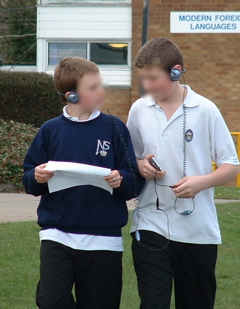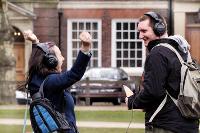A magazine where the digital world meets the real world.
On the web
- Home
- Browse by date
- Browse by topic
- Enter the maze
- Follow our blog
- Follow us on Twitter
- Resources for teachers
- Subscribe
In print
What is cs4fn?
- About us
- Contact us
- Partners
- Privacy and cookies
- Copyright and contributions
- Links to other fun sites
- Complete our questionnaire, give us feedback
Search:
I Predict a Riot

Professor Nigel Smart, Head of the Department of Computer Science at the University of Bristol tells us about the world of mediascapes ...
It was Mark Weiser, chief scientist of Xerox PARC, and the visionary behind ubiquitous computing research, who set the ball rolling and the computers scurrying into the background with his dream of a future free from battles with 'IT':
"There is more information available at our fingertips during a walk in the woods than any computer system, yet people find a walk among the trees relaxing and computers frustrating. Machines that fit the human environment, instead of forcing humans to enter theirs, will make using a computer as refreshing as taking a walk in the woods."
Researchers at Bristol University and the Open University together with collaborators like Hewlett Packard, the BBC and FutureLab have been taking small steps towards Weiser's dream using mobile phones and personal digital assistants (PDAs) to give people 'located' experiences. These systems use natural human movements, like walking, to control applications automatically: the 'computer' changes behaviour depending on where you are.

One way a computer can keep track of location is the Global Positioning System (GPS) - used in cars for SatNav systems. The GPS satellites tell the mobile computer where it is. It then displays information appropriate to that location. Using GPS tracking to trigger the content you see means that you don't have to be consciously interacting with the technology to control the experience. This kind of interaction reduces the need for complex user interfaces and makes the experience a lot more natural.
SatNav is the obvious application but there is a lot more potential than just SatNav for those innovative enough to see the possibilities. The Bristol team have called these types of experiences 'mediascapes': a collection of sounds and images placed digitally in the landscape and accessed using mobile devices. They are exploring a whole bunch of different kinds.
The simplest mediascape application is to turn your mobile computer into a tourist guide. Let's say Jo hasn't been to Bristol before so she downloads a tourist guide to her GPS-enabled mobile phone. She starts walking around the harbourside, and when she approaches the SS Great Britain the mobile phone automatically starts to play audio files about the ship and shows video clips or images of the boat being launched. The effect is like audio guides in museums where you type in a number to get the specific content for that location, but using GPS means the system already knows where you are and where you have been. It is much closer to the way you'd interact with a human guide. Jo only has to walk around the ship naturally to trigger new content without having to interact with any complex interface or even speak.
The research team has gone much further still though and created a series of different kinds of applications each exploring different kinds of novel mediascape experiences - like taking part in a riot!

Kirsten Cater of Bristol University who was one of the researchers behind that project:
"The idea behind Riot! 1831 was that when you walk into Queen Square you actually enter a virtual historical re-enactment of the 19th century riot that took place there and as you walk around the square you trigger different scenes".
Cititag, led by Open University researchers, by contrast explores ubicomp as a game - combining the physical and virtual worlds into a seamless gaming environment. Players roam their real home city searching for other players all of whom are in either 'red' or 'green'. The aim is to tag players of the opposite colour before they tag you: "Urban space becomes a playground and everyone is a suspect."
Most recently the Bristol team have been exploring how they can help everyone join in creating mediascapes trying the ideas out by letting students at Nailsea school design a mediascape of their yet to be built new school and so affect the design. Authoring tools may allow you to create a whole range of new sensor-based experiences with your friends wherever you like! You can already create your own location-based mediascapes.
In the future, location won't be the only sensor that will be used in mediascapes. Other sensors like heart rate monitors, temperature and sound sensors could be used too (see Fizzees). Here is one idea: mobile spy games might get you to run to a particular place but keeping your heart rate and sound level below a certain amount.
The real world has gone multimedia. Riots will never be the same again!


